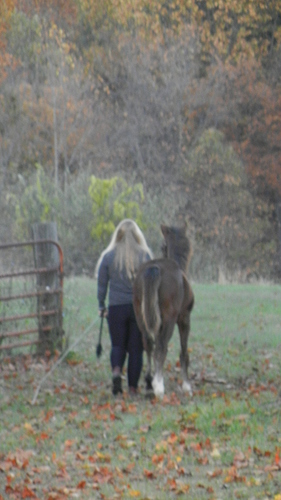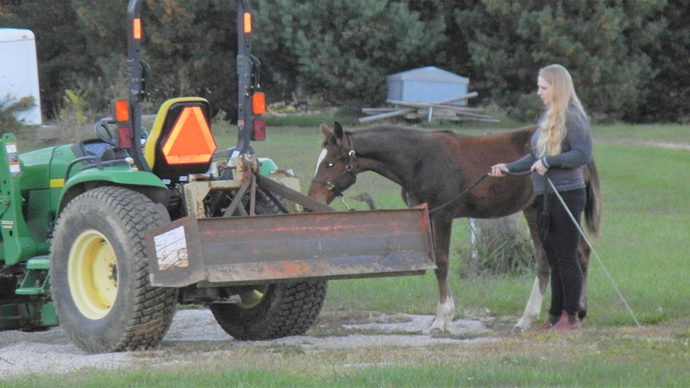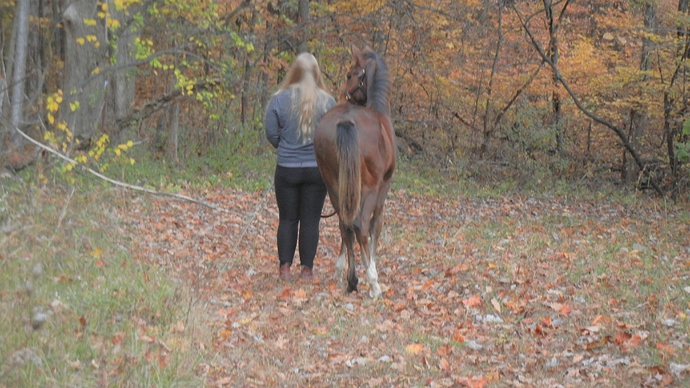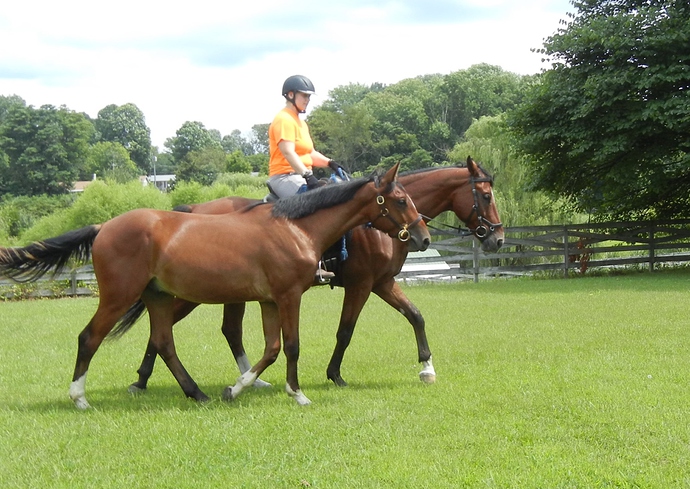@DollyDoll I woke up thinking about this topic (I have a lot of family members sick so I’m not sleeping so well at night these days, this is a nice distraction for my brain! )… and I found this intriguing article from the Western world. It’s worth a read, especially the part about brave vs pushy.
https://westernhorseman.com/horsemanship/create-a-brave-horse/
From the article: “A brave horse is confident, relaxed and at ease with whatever you ask him to do. He is relaxed mentally, and that is what allows him to relax physically. Both physical and mental relaxation are so important… A brave horse is comfortable in his surroundings and in his skin. He’s willing, his head is in a natural position, his ears are relaxed, his eyes are blinking, and he is licking his lips. At the same time, he is alert, and that is different than being scared. An alert horse pays attention to his surroundings and what is going on around him all the time. But he pays attention in a smart way, not in a scared way. He’s interested and responsive.”
The author of this article ( Craig Cameron - it’s actually an excerpt from a book) is of the opinion that brave horses are created not bred. I see his point, but I still think that the truly exceptional horses are a mixture of both.
For me personally, if I was ever asked what the bravest horse I have ever ridden was in my 30+ year riding career… I can probably pick out several jumpers (Thoroughbreds, Holsteiners especially those with the blood of Ladykiller) and one interesting Quarter Horse mare, who stood up to a full charge by a 1600 lb horned bull (beef, not Spanish fighting bulls in case anybody thinks I’m a trainer of bull fighting horses! Although I do have family members who breed those horses and bulls.) Anyway this was a big bull that had been hiding in a creekbed for about a month. He was incredibly aggressive and had hooked one cowdog and charged every cowboy that tried to round him up. We kept running female cows and young cattle past him in the hopes that he would herd up and go with them, but no luck. This bull had literally outsmarted everybody, had found his perfect place in the world, and NOTHING was going to make him move. So there I am, playing cowgirl in my english tack on this mare that has bucked off every guy that gets on her (she’s one of those that “hates men”… but actually it’s not men she hates, she just does not respond well to an aggressive rider because she escalates right back and has learned every trick in the book about bucking people off). I’m guarding this narrow path leading up a mountain to a water hole which is an escape route to 1200 acres of mountains. The other two cowboys + 5 cowdogs gather the aggressive bull along with 2 other more docile bulls. The aggressive bull starts fighting with the younger bulls, then charges up towards me and the mare. I freeze, because I know he has hooked (gored) horses & dogs before. My mare, seeing this massive male animal coming at her, and knowing that her job is to go forward and block him, starts to charge at him, and then I kick her to go with her and yell at the bull to back off… and the bull stops and decides maybe hell hath no fury like a raging Quarter Horse mare coming at him with aggressive female energy! It was one of the most terrifying moments of my equestrian career, but she came through for me and saved me when I froze and did her job just like we’d done a million times before in much less scary situations.
The parallel in the jumper world is that moment when you turn to a difficult 4’6 high (1.40m - my personal height I maxed out on) in-and-out combination or triple combination and you come in waaayyyyy too slow because you are suddenly overanalyzing the situation and your horse effing saves you because you didn’t create the pace, he did in the last 4 strides before the combination. And he did it because he knows his job and he knows that even though you are not asking him to speed up, he better take over because otherwise you are both going to have a terrible accident.
Both of those examples are incredibly incredibly brave horses with courage and a lot of heart. They are the descendants of horses whose ancestors went to war in Europe and the American west and faced danger and did their job anyway in the face of extreme sensory overload and literally people trying to kill them.
That is how I define bravery and courage in that most amazing species, the equine.




